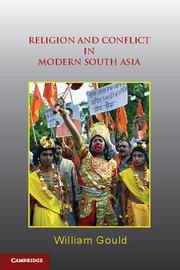Book contents
- Frontmatter
- Contents
- Abbreviations
- Glossary
- Acknowledgements
- 1 Introduction
- 2 Building Spheres of Community
- 3 Transforming Spheres of Community
- 4 Defining Spheres of Community
- 5 State Transformation, Democracy and Conflict
- 6 Forging National Consensus and Containing Pluralism
- 7 New Conflicts and Old Rivalries
- 8 The Resurgence of Communalism?
- Conclusion
- Bibliography
- Index
- References
2 - Building Spheres of Community
1860s–1910s
Published online by Cambridge University Press: 05 June 2012
- Frontmatter
- Contents
- Abbreviations
- Glossary
- Acknowledgements
- 1 Introduction
- 2 Building Spheres of Community
- 3 Transforming Spheres of Community
- 4 Defining Spheres of Community
- 5 State Transformation, Democracy and Conflict
- 6 Forging National Consensus and Containing Pluralism
- 7 New Conflicts and Old Rivalries
- 8 The Resurgence of Communalism?
- Conclusion
- Bibliography
- Index
- References
Summary
In 1890, an eleven-year-old Bengali girl by the name of Phulmonee became the subject of intense public debate across India. She had died as the result of rape by her twenty-nine-year-old husband, Hari Maiti, who had acted on the basis of a traditional life-cyle rite – garbhadan – which permitted a husband to have sexual intercourse with his wife within sixteen days of her first period. A year later in 1891, an Age of Consent Bill was passed that raised the minimum age of consent for married girls to twelve years. The Bill was passed despite the reluctance of representatives of the colonial state itself, and under pressure from Indian reformers. The debate surrounding the Age of Consent Bill created new and urgent discussions about the nature of domestic ‘Hindu’ life. The existence of authoritative religious codes on the rights of husbands to control the lives of girl brides had hindered any suggestion of colonial reform. Indeed, some of the key communities, on which the colonial system depended, backed a vociferous campaign in opposition to the Bill and, most importantly, in opposition to the colonial state. This intrusion into the religious customs of the Hindu family was depicted by journals in Bengal, such as the Bangabasi, as an attack on the sovereignty of the ‘Hindu people’ to control the bodies of women. Some lower-caste communities in north India too in this period aspired to higher ritual status by practicing infant marriage of girls.
The very definition of the Hindu family and ‘community’, the legal rights (or non-rights) of women within it, was therefore, in this debate, played out in relation to a colonial state that sought to recognise and protect vital sources of ‘community’ identity. But, as this chapter will explore, it did so on the basis of fundamental tensions in the relationship between the state and Indian society, which constantly threatened to delegitimise state agencies. In this debate too, new discussions emerged about the relationship between the individual, family and community; about the importance of religion to Indian society; and about the legal and civic rights of women in relation to men. It exposed the means whereby the colonial state sought to ‘discover’ religious custom and the means of communication and publicity that promoted certain selected ideas about religious custom. Throughout the debates on the Age of Consent Bill, as this chapter will explore around broader themes, traditional notions of community rights were being challenged not only in a broad ideological defence against Western modernity, but also from other, non-Brahmanical visions of what constituted a religious community in India.
- Type
- Chapter
- Information
- Religion and Conflict in Modern South Asia , pp. 30 - 79Publisher: Cambridge University PressPrint publication year: 2011



